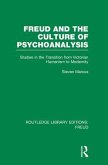Idiomatic Expressions and Somatic Experience in Psychoanalysis examines how verbal and non-verbal language is used in the consulting room, and how those different modes of communication interact to provide a more comprehensive picture of the patient's relational world. It is the product of a comprehensive research project exploring the affinity between idiomatic expressions and somatic behaviors and symptoms. Idiomatic expressions are viewed as bridging the gap between somatic sensations and mental experiences. Ravit Raufman deals with one of the fundamental aspects in human life- the way our behavior is governed by unconscious primary experiences, suggesting methods by which to decipher patient behaviors that are apparently detached and unreasonable. The first part presents case studies of people who enact and revive verbal idiomatic expressions through their behavior. The second describes how therapists use non-verbal mechanisms, operating in their own minds, to understand their patients' inner lives. Based on relational and inter-subjective approaches in psychoanalysis, the case studies illustrate the various ways in which the therapist's subjective experience is "objectively" used to learn about patients' subjective relational experience, so as to verbally formulate experiences that are pre-verbal. Raufman combines Freudian ideas regarding the affinity between somatic symptoms and verbal expressions, with a contemporary relational perspective. The book combines scientific findings with a narrative style, including life-stories of various individuals, as well as a description of the therapist's own subjective experience.¿ This book will appeal to clinical psychologists and psychoanalytic psychotherapists as well as anyone interested in understanding human psyche and behavior.
Bitte wählen Sie Ihr Anliegen aus.
Rechnungen
Retourenschein anfordern
Bestellstatus
Storno









